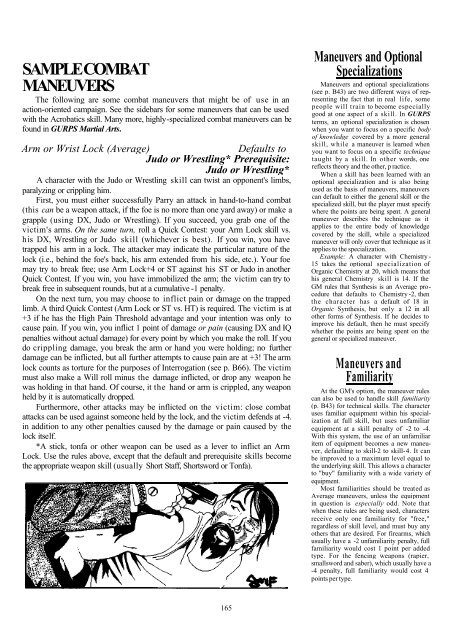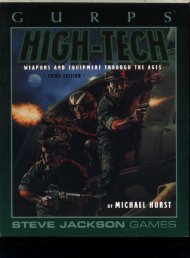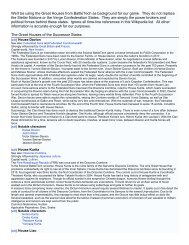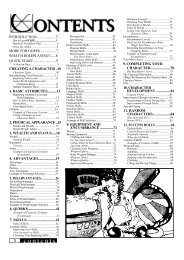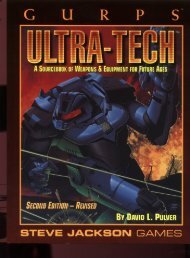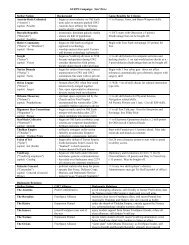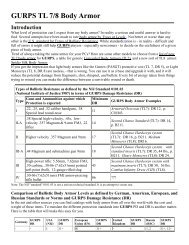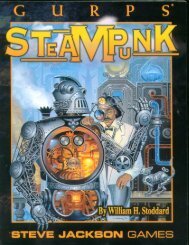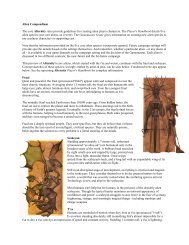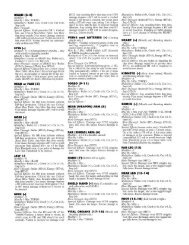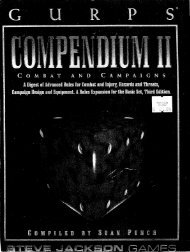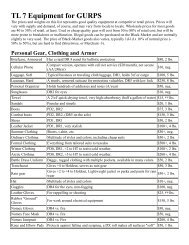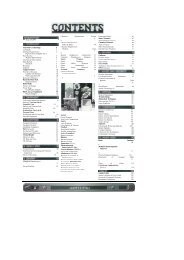GURPS - Compendium 1..
GURPS - Compendium 1..
GURPS - Compendium 1..
You also want an ePaper? Increase the reach of your titles
YUMPU automatically turns print PDFs into web optimized ePapers that Google loves.
SAMPLE COMBAT<br />
MANEUVERS<br />
The following are some combat maneuvers that might be of use in an<br />
action-oriented campaign. See the sidebars for some maneuvers that can be used<br />
with the Acrobatics skill. Many more, highly-specialized combat maneuvers can be<br />
found in <strong>GURPS</strong> Martial Arts.<br />
Arm or Wrist Lock (Average)<br />
Defaults to<br />
Judo or Wrestling* Prerequisite:<br />
Judo or Wrestling*<br />
A character with the Judo or Wrestling skill can twist an opponent's limbs,<br />
paralyzing or crippling him.<br />
First, you must either successfully Parry an attack in hand-to-hand combat<br />
(this can be a weapon attack, if the foe is no more than one yard away) or make a<br />
grapple (using DX, Judo or Wrestling). If you succeed, you grab one of the<br />
victim's arms. On the same turn, roll a Quick Contest: your Arm Lock skill vs.<br />
his DX, Wrestling or Judo skill (whichever is best). If you win, you have<br />
trapped his arm in a lock. The attacker may indicate the particular nature of the<br />
lock (i.e., behind the foe's back, his arm extended from his side, etc.). Your foe<br />
may try to break free; use Arm Lock+4 or ST against his ST or Judo in another<br />
Quick Contest. If you win, you have immobilized the arm; the victim can try to<br />
break free in subsequent rounds, but at a cumulative -1 penalty.<br />
On the next turn, you may choose to inflict pain or damage on the trapped<br />
limb. A third Quick Contest (Arm Lock or ST vs. HT) is required. The victim is at<br />
+3 if he has the High Pain Threshold advantage and your intention was only to<br />
cause pain. If you win, you inflict 1 point of damage or pain (causing DX and IQ<br />
penalties without actual damage) for every point by which you make the roll. If you<br />
do crippling damage, you break the arm or hand you were holding; no further<br />
damage can be inflicted, but all further attempts to cause pain are at +3! The arm<br />
lock counts as torture for the purposes of Interrogation (see p. B66). The victim<br />
must also make a Will roll minus the damage inflicted, or drop any weapon he<br />
was holding in that hand. Of course, it the hand or arm is crippled, any weapon<br />
held by it is automatically dropped.<br />
Furthermore, other attacks may be inflicted on the victim: close combat<br />
attacks can be used against someone held by the lock, and the victim defends at -4.<br />
in addition to any other penalties caused by the damage or pain caused by the<br />
lock itself.<br />
*A stick, tonfa or other weapon can be used as a lever to inflict an Arm<br />
Lock. Use the rules above, except that the default and prerequisite skills become<br />
the appropriate weapon skill (usually Short Staff, Shortsword or Tonfa).<br />
Maneuvers and Optional<br />
Specializations<br />
Maneuvers and optional specializations<br />
(see p. B43) are two different ways of representing<br />
the fact that in real life, some<br />
people will train to become especially<br />
good at one aspect of a skill. In <strong>GURPS</strong><br />
terms, an optional specialization is chosen<br />
when you want to focus on a specific body<br />
of knowledge covered by a more general<br />
skill, while a maneuver is learned when<br />
you want to focus on a specific technique<br />
taught by a skill. In other words, one<br />
reflects theory and the other, p ractice.<br />
When a skill has been learned with an<br />
optional specialization and is also being<br />
used as the basis of maneuvers, maneuvers<br />
can default to either the general skill or the<br />
specialized skill, but the player must specify<br />
where the points are being spent. A general<br />
maneuver describes the technique as it<br />
applies to the entire body of knowledge<br />
covered by the skill, while a specialized<br />
maneuver will only cover that technique as it<br />
applies to the specialization.<br />
Example: A character with Chemistry -<br />
15 takes the optional specialization of<br />
Organic Chemistry at 20, which means that<br />
his general Chemistry skill is 14. If the<br />
GM rules that Synthesis is an Average procedure<br />
that defaults to Chemistry -2, then<br />
the character has a default of 18 in<br />
Organic Synthesis, but only a 12 in all<br />
other forms of Synthesis. If he decides to<br />
improve his default, then he must specify<br />
whether the points are being spent on the<br />
general or specialized maneuver.<br />
Maneuvers and<br />
Familiarity<br />
At the GM's option, the maneuver rules<br />
can also be used to handle skill familiarity<br />
(p. B43) for technical skills. The character<br />
uses familiar equipment within his specialization<br />
at full skill, but uses unfamiliar<br />
equipment at a skill penalty of -2 to -4.<br />
With this system, the use of an unfamiliar<br />
item of equipment becomes a new maneuver,<br />
defaulting to skill-2 to skill-4. It can<br />
be improved to a maximum level equal to<br />
the underlying skill. This allows a character<br />
to "buy" familiarity with a wide variety of<br />
equipment.<br />
Most familiarities should be treated as<br />
Average maneuvers, unless the equipment<br />
in question is especially odd. Note that<br />
when these rules are being used, characters<br />
receive only one familiarity for "free,"<br />
regardless of skill level, and must buy any<br />
others that are desired. For firearms, which<br />
usually have a -2 unfamiliarity penalty, full<br />
familiarity would cost 1 point per added<br />
type. For the fencing weapons (rapier,<br />
smallsword and saber), which usually have a<br />
-4 penalty, full familiarity would cost 4<br />
points per type.<br />
165


